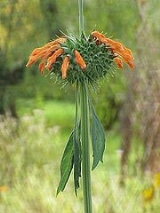
Leonotis nepetifolia
Encyclopedia
Leonotis nepetifolia, also known as Klip Dagga or Lion's Ear, is a species of plant
in the Leonotis
genus and the Lamiaceae
(mint
) family. While most other species in this genus are native to Southern Africa
, L. nepetifolia is native to tropical Africa
and southern India
. It grows to a height of 3 metres and has whorls of striking lipped flowers, that are most commonly orange, but can vary to red, white, and purple. It has very soft serrated leaves that can grow up to 4 inches wide.
(Wild Dagga or Lion's Tail.) The most noticeable difference between the two is the leaf shape. Leaves are *cordate* with serrated edges on L. nepetifolia, except the top pair which is lanceolate with serrated edges as pictured in taxonomy box. The leaves are all lanceolate with serrated edges on L. leonurus.
as shandilay and the leaves are brewed as a tea for fever
, cough
s, womb prolapse and malaria
.
Plant
Plants are living organisms belonging to the kingdom Plantae. Precise definitions of the kingdom vary, but as the term is used here, plants include familiar organisms such as trees, flowers, herbs, bushes, grasses, vines, ferns, mosses, and green algae. The group is also called green plants or...
in the Leonotis
Leonotis
Leonotis is a genus of flowering plants in the family Lamiaceae. It comprises 9 species. One of these, Leonotis nepetifolia, is native to tropical Africa and southern India. It is naturalized throughout most of the tropics. The other 8 species are endemic to southern Africa...
genus and the Lamiaceae
Lamiaceae
The mints, taxonomically known as Lamiaceae or Labiatae, are a family of flowering plants. They have traditionally been considered closely related to Verbenaceae, but in the 1990s, phylogenetic studies suggested that many genera classified in Verbenaceae belong instead in Lamiaceae...
(mint
Mentha
Mentha is a genus of flowering plants in the family Lamiaceae . The species are not clearly distinct and estimates of the number of species varies from 13 to 18. Hybridization between some of the species occurs naturally...
) family. While most other species in this genus are native to Southern Africa
Africa
Africa is the world's second largest and second most populous continent, after Asia. At about 30.2 million km² including adjacent islands, it covers 6% of the Earth's total surface area and 20.4% of the total land area...
, L. nepetifolia is native to tropical Africa
Africa
Africa is the world's second largest and second most populous continent, after Asia. At about 30.2 million km² including adjacent islands, it covers 6% of the Earth's total surface area and 20.4% of the total land area...
and southern India
India
India , officially the Republic of India , is a country in South Asia. It is the seventh-largest country by geographical area, the second-most populous country with over 1.2 billion people, and the most populous democracy in the world...
. It grows to a height of 3 metres and has whorls of striking lipped flowers, that are most commonly orange, but can vary to red, white, and purple. It has very soft serrated leaves that can grow up to 4 inches wide.
Related species
L. nepetifolia (Klip Dagga) is related to L. leonurusLeonotis leonurus
Leonotis leonurus, also known as Lion's Tail and Wild Dagga, is a plant species in the Lamiaceae family. The plant is a broadleaf evergreen large shrub native to South Africa and southern Africa, where it is very common. It is known for its medicinal and mild psychoactive...
(Wild Dagga or Lion's Tail.) The most noticeable difference between the two is the leaf shape. Leaves are *cordate* with serrated edges on L. nepetifolia, except the top pair which is lanceolate with serrated edges as pictured in taxonomy box. The leaves are all lanceolate with serrated edges on L. leonurus.
Medicinal use
L. nepetifolia is known in TrinidadTrinidad
Trinidad is the larger and more populous of the two major islands and numerous landforms which make up the island nation of Trinidad and Tobago. It is the southernmost island in the Caribbean and lies just off the northeastern coast of Venezuela. With an area of it is also the fifth largest in...
as shandilay and the leaves are brewed as a tea for fever
Fever
Fever is a common medical sign characterized by an elevation of temperature above the normal range of due to an increase in the body temperature regulatory set-point. This increase in set-point triggers increased muscle tone and shivering.As a person's temperature increases, there is, in...
, cough
Cough
A cough is a sudden and often repetitively occurring reflex which helps to clear the large breathing passages from secretions, irritants, foreign particles and microbes...
s, womb prolapse and malaria
Malaria
Malaria is a mosquito-borne infectious disease of humans and other animals caused by eukaryotic protists of the genus Plasmodium. The disease results from the multiplication of Plasmodium parasites within red blood cells, causing symptoms that typically include fever and headache, in severe cases...
.
External links
- On the psychoactive effects of L. nepetifolia
- FloraBase - Information on L. nepetifolia in Western Australia
- Information on cultivating ethnoplants cultivating L.nepetifolia (French)

